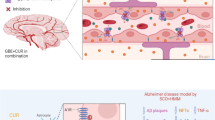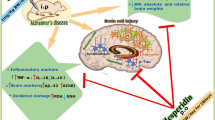Abstract
The effects ofbis(7)-tacrine, a novel acetylcholinesterase inhibitor, on cognitive impairment and neuronal degeneration induced by permanent ligation of bilateral common carotid arteries (2VO) were investigated using the Morris water maze in rats. Once daily oral administration ofbis(7)-tacrine (0.025, 0.05 and 0.1 mg·kg−1) was started 14 days after 2VO operation. Over a three-week treatmentbis(7)-tacrine effectively reversed 2VO-induced spatial memory deficits in a dose-dependent fashion. Furthermore, histological observation showedbis(7)-tacrine decreased the neuropathological changes in the 2VO rats brain. These results suggest thatbis(7)-tacrine has therapeutic potential for the treatment of dementia caused by chronic cerebral hypoperfusion.
Similar content being viewed by others
References
Gottfries C G, Blennow K, Karlsson I,et al. The Neurochemistry of Vascular Dementia.Dementia, 1994,5(3–4):163–167.
Tohgi H, Abe T, Kimura M,et al. Cerebrospinal Fuid Acetycholine and Choline in Vascular Dementia of Binswanger and Multiple Small Infarct Types as Compared with Alzheimer-Type Dementia.J Neural Transm, 1996,103(10):1211–1220.
Wang H, Carlier P R, Ho W L,et al. Attenuation of Scopolamine-Induced Deficits in Navigational Memory Performance in Rats byBis(7)-Tacrine, a Novel Dimeric AChE Inhibitor.Acta Pharmacol Sin, 1999,20(3): 211–217.
Wang H, Carlier P R, Ho W L,et al. Effects ofBis(7)-Tacrine, a Novel Anti-Alzheimer's Agent, on Rat Brain AchE.Neuroreport, 1999,10(4):789–793.
Wu D C, Xiao X Q, Ng A K Y,et al. Protection A-gainst Ischemic Injury in Primary Cultured Mouse Astrocytes byBis(7)-tacrine, a Novel Anti-Alzheimer Agent.Neuroscience Letters, 2000,288(2):95–98.
Roman G C, Tatemichi T K, Erkinjuntti T,et al. Vascular Dementia: Diagnostic Criteria for Research Studies.Neurology, 1993,43(2):250–260.
Tsuchiya M, Sako K, Yura S,et al. Local Cerebral Glucose Utilisation Following Acute and Chronic Bilateral to Changes in Local Cerebral Blood Flow.Exp Brain Res, 1993,95(1):1–7.
Nanri M and Watanabe H. Availability of 2VO Rats as a Model for Chronic Cerebrovascular Disease.Folia Pharmacol Jpn, 1999,113(2):85–95.
de la Torre J C. Impaired Brain Microcirculation May Trigger Alzheimer's Disease.Neurosci Biobehav Rev, 1994,18(3):397–401.
Morris R. Developments of a Water-Maze Procedure for Studying Spatial Learning in the Rat.J Neurosci Methods, 1984,11(1):47–60.
de la Torre J C, Fortin T, Park G Aet al. Can Disturbed Brain Microcirculation Cause Alzheimer's Disease?Neurological Res, 1993,15(3):146–153.
Ni J, Ohta H, Matsumoto K,et al. Progressive Cognitive Impairment Following Chronic Cerebral Hypoperfusion Induced by Permanent Occlusion of Bilateral Carotid Arteries in Rats.Brain Res, 1994,653(1–2):231–236.
Ohta H, Nishikawa H, Kimura H,et al. Chronic Cerebral Hypoperfusion by Permanent Internal Carotid Ligation Produces Learning Impairment without Brain Damage in Rats.Neuroscience, 1997,79 (4):1039–1050.
Tanaka K, Ogawa N, Asanuma M,et al. Relationship between Cholinergic Dysfunction and Discrimination Learning Disabilities in Wistar Rats Following Chronic Cerebral Hypoperfusion.Brain Res, 1996,729(1):55–65.
Vesce S, Bezzi P and Volterra A. The Highly Integrated Dialogue between Neurons and Astrocytes in Brain Function.Sci Prog, 1999,82(pt3):251–270.
Kaplan J, Dimlich R V, Briosmr I,et al. Mechanisms of Ischemic Cerebral Injury.Resuscitation, 1987,15(3):149–169.
Author information
Authors and Affiliations
Additional information
Foundation item: Supported by the National Natural Science Foundation of China (No: 30170335)
Biography: Peng Feng-fang(1966-), female Master, research direction: Alzheimer's disease and ischemia
Rights and permissions
About this article
Cite this article
Fang-fang, P., Bai-fang, Z., Jiang-zhou, Z. et al. Bis(7)-tacrine ameliorates cognitive impairment caused by cerebral hypoperfusion in rats. Wuhan Univ. J. Nat. Sci. 7, 248–252 (2002). https://doi.org/10.1007/BF02830328
Received:
Issue Date:
DOI: https://doi.org/10.1007/BF02830328
Key words
- bis(7)-tacrine
- acetylcholinesterase inhibitor
- permanent bilateral occlusion of common carotid arteries
- vascular dementia




